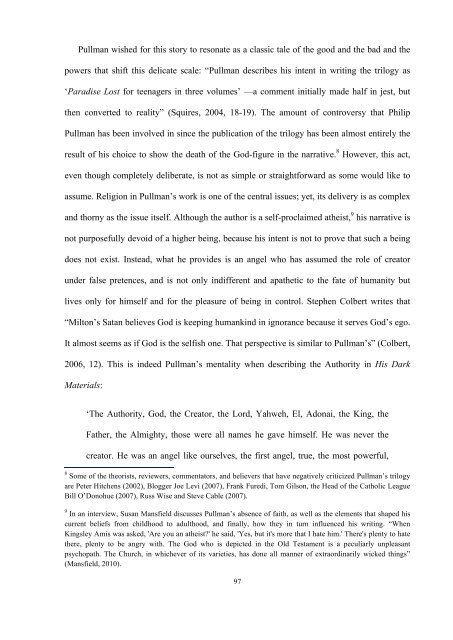The secular angel in contemporary children's literature: David ...
The secular angel in contemporary children's literature: David ...
The secular angel in contemporary children's literature: David ...
Create successful ePaper yourself
Turn your PDF publications into a flip-book with our unique Google optimized e-Paper software.
Pullman wished for this story to resonate as a classic tale of the good and the bad and the<br />
powers that shift this delicate scale: “Pullman describes his <strong>in</strong>tent <strong>in</strong> writ<strong>in</strong>g the trilogy as<br />
‘Paradise Lost for teenagers <strong>in</strong> three volumes’ —a comment <strong>in</strong>itially made half <strong>in</strong> jest, but<br />
then converted to reality” (Squires, 2004, 18-19). <strong>The</strong> amount of controversy that Philip<br />
Pullman has been <strong>in</strong>volved <strong>in</strong> s<strong>in</strong>ce the publication of the trilogy has been almost entirely the<br />
result of his choice to show the death of the God-figure <strong>in</strong> the narrative. 8 However, this act,<br />
even though completely deliberate, is not as simple or straightforward as some would like to<br />
assume. Religion <strong>in</strong> Pullman’s work is one of the central issues; yet, its delivery is as complex<br />
and thorny as the issue itself. Although the author is a self-proclaimed atheist, 9 his narrative is<br />
not purposefully devoid of a higher be<strong>in</strong>g, because his <strong>in</strong>tent is not to prove that such a be<strong>in</strong>g<br />
does not exist. Instead, what he provides is an <strong>angel</strong> who has assumed the role of creator<br />
under false pretences, and is not only <strong>in</strong>different and apathetic to the fate of humanity but<br />
lives only for himself and for the pleasure of be<strong>in</strong>g <strong>in</strong> control. Stephen Colbert writes that<br />
“Milton’s Satan believes God is keep<strong>in</strong>g humank<strong>in</strong>d <strong>in</strong> ignorance because it serves God’s ego.<br />
It almost seems as if God is the selfish one. That perspective is similar to Pullman’s” (Colbert,<br />
2006, 12). This is <strong>in</strong>deed Pullman’s mentality when describ<strong>in</strong>g the Authority <strong>in</strong> His Dark<br />
Materials:<br />
‘<strong>The</strong> Authority, God, the Creator, the Lord, Yahweh, El, Adonai, the K<strong>in</strong>g, the<br />
Father, the Almighty, those were all names he gave himself. He was never the<br />
creator. He was an <strong>angel</strong> like ourselves, the first <strong>angel</strong>, true, the most powerful,<br />
8 Some of the theorists, reviewers, commentators, and believers that have negatively criticized Pullman’s trilogy<br />
are Peter Hitchens (2002), Blogger Joe Levi (2007), Frank Furedi, Tom Gilson, the Head of the Catholic League<br />
Bill O’Donohue (2007), Russ Wise and Steve Cable (2007).<br />
9 In an <strong>in</strong>terview, Susan Mansfield discusses Pullman’s absence of faith, as well as the elements that shaped his<br />
current beliefs from childhood to adulthood, and f<strong>in</strong>ally, how they <strong>in</strong> turn <strong>in</strong>fluenced his writ<strong>in</strong>g. “When<br />
K<strong>in</strong>gsley Amis was asked, 'Are you an atheist?' he said, 'Yes, but it's more that I hate him.' <strong>The</strong>re's plenty to hate<br />
there, plenty to be angry with. <strong>The</strong> God who is depicted <strong>in</strong> the Old Testament is a peculiarly unpleasant<br />
psychopath. <strong>The</strong> Church, <strong>in</strong> whichever of its varieties, has done all manner of extraord<strong>in</strong>arily wicked th<strong>in</strong>gs”<br />
(Mansfield, 2010).<br />
97
















